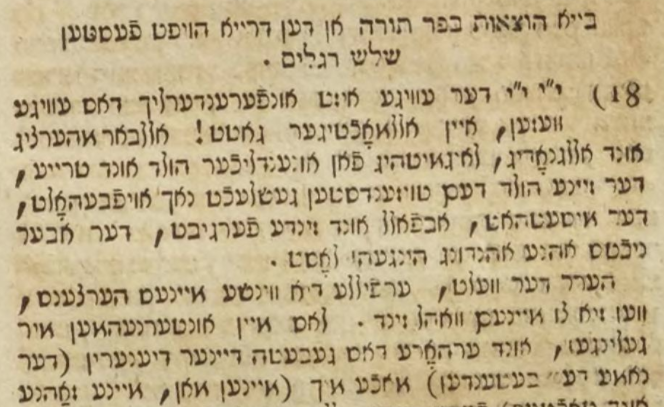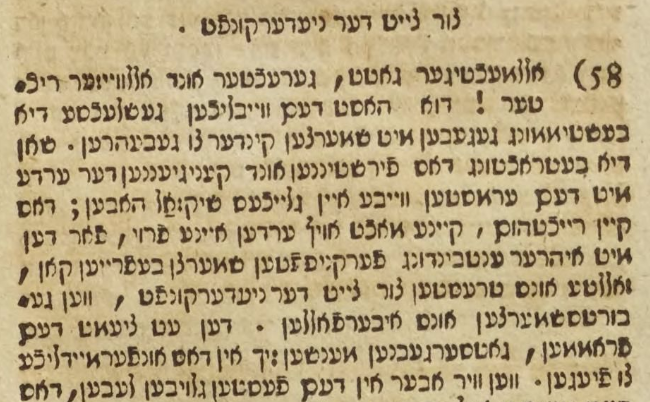| Source (German) | Translation (English) |
|---|---|
In der Sephira.[1] Siehe Anhang. |
During the Sefirat haOmer.[2] See appendix. |
Du bist heilig und deine Gebote sind heilig, wohl dem, dem dir in deinen Geboten lebt; wohl dem, dem ein Strahl deines Lichtes den Lebenspfad erleuchtet, daß er die Weisheit deiner Lehre erkennt. Er wird entzückt mit dem frommen Sänger ausrufen: „Die Lehre deines Mundes ist mir lieber als Tausende von Gold und Silber” (Psalm 119:72). Ihr sollt euch zählen vom andern Tage des Osterfestes, vom Tage da ihr das Omer der Wendung gebracht, sieben ganze Wochen, dann bringt ihr neue Speiseopfer, dem Ewigen zu Ehren, nämlich zwei Brode vom feinsten Mehl als Erstlinge (3 B. Mos. 23, 15-17). Am zweiten Osterfeiertage, zu welcher Zeit in dem gesegneten Lande unserer Vorfahren die Erndte anfing, wurden einige reife Aehren dem Priester gebracht, der sie vor Gott erhob, und dann erst durfte man von der neuen Erndte Gebrauch machen. |
You are holy, and your commandments are holy; good to him who lives in your commandments; good to him to whom a ray of your light enlightens the path of life, that he may know the wisdom of your teaching. He will exclaim delightedly with the pious singer: “The teaching of your mouth is dearer to me than thousands of gold and silver” (Psalm 119:72). “You shall count yourselves from the second day of the Spring Festival, from the day you brought the Omer of waving, seven whole weeks, you will bring new grain offerings in honor of the Eternal, namely, two loaves of the finest flour as first-fruits” (Leviticus 23:15-17). On the second Spring Festival, at which time the harvest began in the blessed land of our ancestors, a few ripe ears were brought to the priest, who raised them before God, and only then was the new harvest allowed to be used. |
Im Genuß der Güter des Lebens ist man so sehr geneigt dessen zu vergessen, von dem alles Gute kommt; daher denn jenes geringe Opfer vor dem Genuße, zur Erinnerung, daß Gott der Geber alles Guten sei, daß wir ihm das Gedeihen der neuen Frucht zu verdanken haben. Dir, Allgütiger, waren auch alle Erstlinge geheiligt, daß wir die Lehre stets vor Augen haben möchten, daß du die Welt durch deine Güte erhälst, und daß durch deinen Willen alles in der Natur erfolgt. Wenn du deinen Blick von den Geschöpfen wegwendetest, würde ein Stillstand in der Natur entstehen, und alle Kraft und alles Gedeihen würde schwinden. Bringen wir auch heut zu Tage keinen Omer mehr, so mögen wir die Wahrheit stets vor Augen haben, daß wir deiner Allgüte alles verdanken, und bei jedem Genuße wollen wir dir das Opfer bringen, das du so wohlgefällig aufnimmst, nämlich eine Gabe an die Dürftigen und Leidenden. Durch diese Opfer wollen wir uns deines Segens werth machen. Du wirst die Erndte des Jahres segnen, und die Erde vor Mangel bewahren, auf daß wir freudig unser Auge zu dir, Vater, erheben können, und dich preisen ewiglich! Amen. |
In the enjoyment of the goods of life, one is so inclined to forget Him from whom all good things come; hence that small offering before the enjoyment, as a reminder that God is the giver of all good things, that we owe the flourishing of the new fruit to Him. All the first-fruits were also sanctified to you, All-good One, so that we may always have before our eyes the teaching that you sustain the world by your goodness, and that by your will everything in nature takes place. If you turned your gaze away from the creatures, there would be a standstill in nature, and all strength and prosperity would disappear. Even if we do not bring any more Omer today, we may always have the truth before our eyes that we owe everything to your omnibenevolence, and with every enjoyment we want to bring you the offering which you so graciously receive, namely a gift to the needy and suffering. Through these offerings we want to make ourselves worthy of your blessing. You will bless the harvest of the year and protect the earth from lack, so that we can joyfully lift our eyes to you, Father, and praise you forever! Amen. |
“In der Sephira” was translated/adapted by Yehoshua Heshil Miro and published in his anthology of teḥinot, בית יעקב (Beit Yaaqov) Allgemeines Gebetbuch für gebildete Frauen mosaischer Religion. It first appears in the 1829 edition, תחנות Teḥinot ein Gebetbuch für gebildete Frauenzimmer mosaischer Religion as teḥinah №25 on pp. 32-33. In the 1835 edition, it appears as teḥinah №24 on pp. 37-38. In the 1842 edition, it appears as teḥinah №27 on pp. 40-41.
We welcome corrections and improvements. The transcription of the German from Latin script in Fraktur type provided machine-readable text for a machine translation by DeepL, which we then edited for accuracy and clarity. –Aharon Varady
Source(s)



“In der Sephira | Prayer during the Sefirat ha-Omer, a teḥinah by Yehoshua Heshil Miro (1829)” is shared through the Open Siddur Project with a Creative Commons Attribution-ShareAlike 4.0 International copyleft license.










Leave a Reply